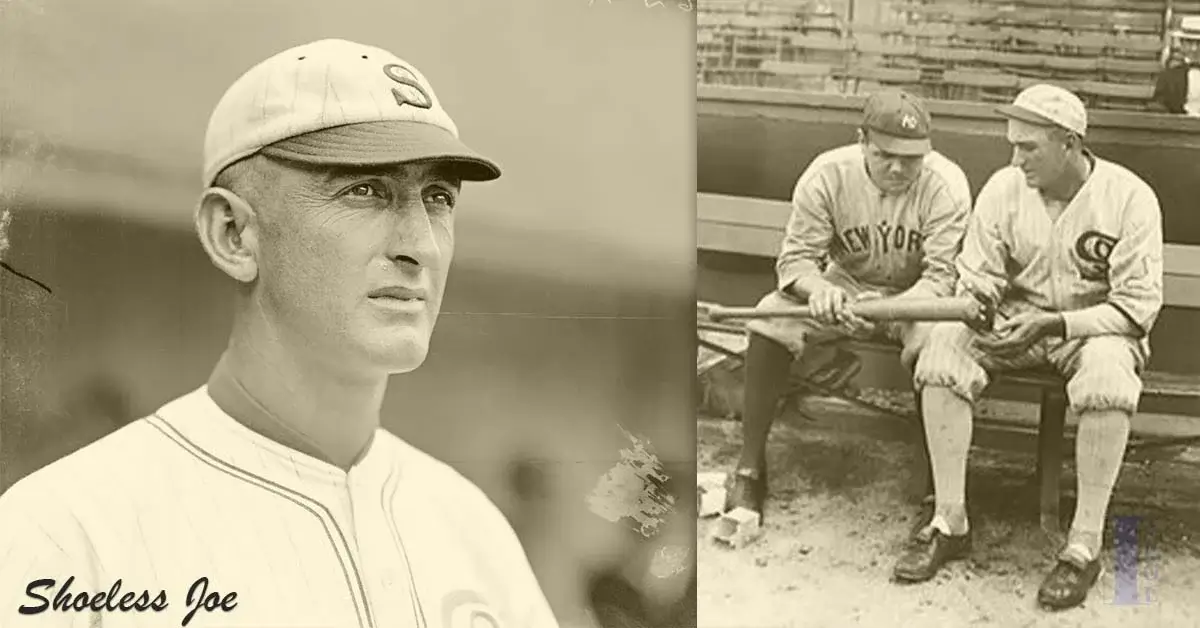Early Life and Hardships
Born on July 16, 1887, in Pickens County, South Carolina, Joseph Jefferson Jackson, fondly known as “Shoeless Joe,” faced a challenging childhood. His family, led by his sharecropper father, relocated to Pelzer, South Carolina, when he was just a baby. Later, they moved to Brandon Mill, a company town near Greenville. Tragedy struck at the age of 10 when Joe battled a severe case of measles, leaving him bedridden and paralyzed for two months. His mother’s dedicated care nursed him back to health.
As the oldest son in a struggling family, Joe began working at a textile mill at the tender age of 6 or 7, earning a meager wage as a “linthead.” The family’s financial constraints meant education was a luxury they couldn’t afford, and Joe remained uneducated throughout his life.
In 1900, at just 13 years old, Joe’s life took a turn when he joined the Brandon Mill baseball team. Initially a pitcher, his remarkable hitting ability quickly shifted him to the outfield. Despite being the youngest player on the team, Joe’s talent made him a local celebrity. He earned $2.50 per game, a significant amount for the time.
By 1905, Joe moved through various mill teams in pursuit of better pay, transitioning into semi-professional baseball. During this period, he gained recognition and was often compared to other successful players from the mills, such as Champ Osteen.
The Origins of “Shoeless Joe”
In a 1949 interview with Sport magazine, Joe recounted the incident that led to his enduring nickname. During a mill game in Greenville, South Carolina, he developed blisters from a new pair of cleats, causing him intense pain. Opting for comfort, he took off his shoes while at bat. Observing Joe running to third base in his socks, a heckling fan exclaimed, “You shoeless son of a gun, you!” This quirky incident resulted in the moniker “Shoeless Joe,” a name that stuck with him throughout his life.
Despite his lack of formal education, Joe Jackson’s baseball prowess was undeniable. Playing for three MLB teams over 12 years, he achieved a career batting average of .356, the fourth-highest in MLB history. His standout performance in the 1919 World Series, where he set a record with 12 base hits, became overshadowed by the infamous Black Sox Scandal.
The 1919 Chicago White Sox, including Jackson, were accused of conspiring to fix the World Series. Despite his exceptional performance during the Series, Commissioner Kenesaw Mountain Landis banned Jackson from baseball after the 1920 season. This banishment, along with the controversial role he played in the scandal, led to heated debates about Jackson’s place in baseball history.
Who is Atila Altaunbay? – Life, Love, Career & Much More
In 1999, Joe Jackson was ranked 35th on The Sporting News’ list of the 100 Greatest Baseball Players. He remains a polarizing figure, with fans and experts divided over whether he should be included in the Baseball Hall of Fame. The debate continues, with Jackson’s legacy forever intertwined with the highs and lows of America’s favorite pastime.
Shoeless Joe Jackson’s Journey Through Professional Baseball
In 1908, Joe Jackson kickstarted his professional baseball adventure with the Greenville Spinners of the Carolina Association. During this time, he not only entered the world of professional sports but also made a significant personal move by marrying 15-year-old Katie Wynn. Soon after, he caught the attention of Connie Mack, signing on to play for the Philadelphia Athletics.
Paige Bueckers’ Romantic Relationship
Beginning with his hometown minor league team, the Greenville Spinners, Jackson showcased his batting prowess, hitting .346 and leading the league in hits and RBI in the 1908 Carolina Association. This performance didn’t go unnoticed, and in August 1908, Connie Mack purchased his contract for $900, marking Jackson’s major league debut.
The initial years with the Athletics proved challenging for Jackson. Reports conflicted on whether he struggled with the big city or faced hazing from teammates. Consequently, he spent much of his time in the minor leagues, making just 10 MLB appearances between 1908 and 1909. In 1909, he played for the South Atlantic League’s Savannah Indians, boasting a .358 batting average.
In 1910, the Athletics traded Jackson to the Cleveland Naps. Before making the move, he spent most of the season with the New Orleans Pelicans of the Southern Association, securing the batting title and leading the team to the pennant. His late-season call-up to the big league team saw him play 20 games with an impressive .387 batting average.
Major League Stardom
Jackson’s first full MLB season in 1911 set the stage for his brilliance. He set several rookie records, including a remarkable .408 batting average, standing second in the league behind Ty Cobb. His .468 on-base percentage led the league. The following year, Jackson continued to shine, batting .395 and leading the American League in hits, triples, and total bases.
His trade to the Chicago White Sox in August 1915 marked a turning point in his career. Two years later, Jackson played a pivotal role in the White Sox winning the American League pennant and the subsequent World Series, where he hit .307 against the New York Giants.
Impact of World War I and Post-War Return
World War I interrupted Jackson’s career as he spent most of the 1918 season working in a shipyard. However, he made a strong return in 1919, posting a .351 average in the regular season and an impressive .375 with flawless fielding in the World Series, despite the White Sox losing to the Cincinnati Reds.
The Controversial 1920 Season
In the 1920 season, at the age of 32, Jackson was having one of his best seasons. He led the American League in triples and set career records for home runs, RBIs, and fewest strikeouts per plate appearance. However, his season was abruptly halted when he, along with seven other White Sox members, was suspended due to allegations of throwing the previous World Series – an event that would forever cast a shadow over Shoeless Joe Jackson’s illustrious career.
The Black Sox Scandal: Shoeless Joe Jackson’s Fall from Grace
Following the Chicago White Sox’s loss to the Cincinnati Reds in the 1919 World Series, allegations surfaced that eight players, including the legendary Shoeless Joe Jackson, had accepted $5,000 each (equivalent to $84,000 in 2022) to intentionally throw the Series. In September 1920, a grand jury was convened to delve into these serious accusations.
Despite Jackson’s outstanding performance in the Series, setting a record with 12 base hits and leading both teams with a .375 batting average, suspicions arose. Notably, he committed no errors and even threw out a runner at the plate. However, the Reds hit an unusually high number of triples to Jackson’s position in left field, prompting questions about the outfielders’ positioning.
During grand jury testimony on September 28, 1920, it was alleged that Jackson admitted to participating in the fix. This revelation added fuel to the already raging controversy surrounding the Series.
Acquittal and Lifetime Ban
In 1921, a Chicago jury acquitted Jackson and his seven teammates of any wrongdoing. Despite this legal victory, Commissioner of Baseball Kenesaw Mountain Landis, in a bold move, imposed a lifetime ban on all eight players. Landis asserted that regardless of the legal verdict, any player involved in fixing or planning to throw games would never play professional baseball.
The “Say It Ain’t So, Joe” Moment
After the grand jury’s indictments, Charley Owens of the Chicago Daily News penned a tribute titled “Say it ain’t so, Joe.” The phrase became legendary, mistakenly attributed to a child outside the courthouse. As Jackson left the court, a youngster, grabbing his coat sleeve, asked, “It ain’t true, is it, Joe?” Jackson, allegedly, replied with a heavy heart. This iconic exchange symbolized the disappointment of fans.
However, in a later interview, Jackson refuted the existence of this legendary exchange, emphasizing that it never occurred. The truth behind this poignant moment remained a subject of speculation and controversy, adding another layer to the enigma of Shoeless Joe Jackson’s involvement in the Black Sox Scandal.
Debates Surrounding Shoeless Joe Jackson’s Alleged Guilt
The controversy over Shoeless Joe Jackson’s involvement in the 1919 Black Sox Scandal has persisted over the years. It’s reported that Jackson, despite facing a tempting $5,000 bribe that would have doubled his salary, refused it not once but twice. In a surprising turn, his teammate Lefty Williams tossed the cash into his hotel room, complicating Jackson’s association with the scandal. Jackson purportedly attempted to inform White Sox owner Charles Comiskey about the fix, but his efforts were thwarted as Comiskey declined to meet with him.
Legal Representation and Alleged Coercion
Jackson’s legal journey was riddled with challenges. Unable to afford proper legal counsel, he was represented by team attorney Alfred Austrian, creating an inherent conflict of interest. Before Jackson’s grand jury testimony, Austrian, according to reports, used whiskey to elicit Jackson’s admission of his supposed involvement in the fix. Moreover, Austrian convinced the nearly illiterate Jackson to sign a waiver of immunity from prosecution, adding another layer of complexity to the legal proceedings.
Teammates’ Testimonies and Statistical Analysis
In later years, the seven other players implicated in the scandal affirmed that Jackson was never present at any meetings discussing the fix. Williams revealed that Jackson’s name was merely invoked to lend credibility to their plot, leaving questions about why Jackson would be paid $5,000 if he was not directly involved. A 1993 statistical analysis of Jackson’s performance in the 1919 World Series suggested substantial support for his claims of innocence, casting doubt on the narrative of his active participation in the fix.
Challenges to Historical Accounts
In 2009, a Chicago Lawyer magazine article challenged the accuracy of Eliot Asinof’s 1963 book “Eight Men Out,” which seemingly confirmed Jackson’s guilt. The article pointed out inaccuracies, such as Jackson never confessing to throwing the series. Asinof’s omission of key facts from public documents raised doubts about the historical accuracy of the book.
Reinstatement Efforts and Commissioner’s Review
Efforts to reinstate Shoeless Joe Jackson into baseball’s good graces faced repeated obstacles. In 1989, MLB Commissioner A. Bartlett Giamatti opted against reinstating Jackson, suggesting that the case was better suited for historical analysis rather than present-day review. The U.S. House of Representatives passed a symbolic resolution in 1999 praising Jackson’s sporting achievements and urging MLB to rescind his ineligibility.
In 2015, the Shoeless Joe Jackson Museum petitioned Commissioner Rob Manfred for reinstatement, arguing that Jackson had more than served his sentence. However, Manfred denied the request, expressing uncertainty over the truth after 95 years since the banishment. In 2020, ESPN reported a shift in MLB’s policy, indicating that banned players no longer faced restrictions after death. This development left uncertainty about its potential impact on Shoeless Joe Jackson’s Hall of Fame prospects. The debates surrounding Jackson’s guilt continue to be a complex and contentious aspect of baseball history.
Shoeless Joe Jackson’s Later Years: A Life Beyond Baseball
Following the tumultuous events surrounding the Black Sox Scandal and the banishment from professional baseball, Shoeless Joe Jackson continued his involvement with the sport. Over the next two decades, he played with and managed various semi-professional teams, often adopting different names to escape the shadow of his controversial past. These teams were primarily based in Georgia and South Carolina, reflecting Jackson’s enduring passion for the game.
Entrepreneurial Ventures and Business Ventures
In 1922, Jackson and his wife, Katie, took a different path as they moved to Savannah, Georgia. There, they embarked on an entrepreneurial journey by opening a dry cleaning business. However, their journey didn’t stop there. In 1933, the couple returned to Greenville, South Carolina, where they initially ventured into the restaurant business, opening a barbecue joint. Subsequently, they transitioned into the liquor business, operating “Joe Jackson’s Liquor Store” until Jackson’s passing.
Encounter with Ty Cobb and Grantland Rice
One notable episode from Jackson’s post-major league life occurred in his liquor store. Baseball legend Ty Cobb, accompanied by sportswriter Grantland Rice, entered the store. Jackson, seemingly oblivious to Cobb’s presence, showed no signs of recognition. It was only after Cobb made his purchase that he asked, “Don’t you know me, Joe?” Jackson, with a calm demeanor, responded, “Sure, I know you, Ty, but I wasn’t sure you wanted to know me. A lot of them don’t.” This encounter captured the complex dynamics and lingering sentiments surrounding Jackson’s legacy.
Health Struggles and Passing
As the years passed, Jackson faced health challenges, particularly heart trouble. In 1951, at the age of 64, he succumbed to a heart attack. Shoeless Joe Jackson became the first among the eight banned players to pass away. His final resting place is at Woodlawn Memorial Park in Greenville, where he lies at rest. Despite not having children of his own, Jackson and his wife played a significant role in raising two of his nephews, leaving behind a legacy that extended beyond the baseball diamond.
Shoeless Joe Jackson’s Enduring Legacy
Honors and Memorials
Despite being banned from Major League Baseball, Shoeless Joe Jackson’s legacy lives on through various honors and memorials. Notably, the Shoeless Joe Jackson Memorial Park in Greenville stands as a testament to his impact on the sport. A life-size statue, crafted by sculptor Doug Young, graces the West End of Greenville, further immortalizing Jackson’s contributions.
In 2006, Jackson’s original home found a new home adjacent to Fluor Field in downtown Greenville. The restored residence was transformed into the Shoeless Joe Jackson Museum, officially opened in 2008. The museum’s address, 356 Field Street, pays homage to Jackson’s remarkable lifetime batting average. The restoration process was documented on TLC’s reality show “The Real Deal,” showcasing the efforts to preserve this piece of baseball history.
Cleveland Indians Hall of Fame Induction
In 1951, Jackson received posthumous recognition as he was inducted into the Cleveland Indians Hall of Fame, becoming part of its inaugural class. This selection stirred controversy due to the brevity of his tenure with the Naps/Indians and the fact that he had not yet been enshrined in the National Baseball Hall of Fame. However, overwhelming support from Indians fans led to his unanimous election by sports editors.
Baseball Reliquary’s Shrine of the Eternals
In 2002, Shoeless Joe Jackson was honored with induction into the Baseball Reliquary’s Shrine of the Eternals, recognizing his enduring impact on the game.
Shoeless Joe’s baseball legacy extended to his descendants, particularly his great-great-grandnephew, Joseph Ray Jackson. Joseph made history as the first relative to play professional baseball since Shoeless Joe’s banishment. With an impressive .386 batting average for The Citadel in 2013, he was drafted by the Texas Rangers and later debuted professionally with the Spokane Indians in the Northwest League.
Record-Breaking Sale of Memorabilia
In a testament to Shoeless Joe Jackson’s enduring popularity, a signed photograph of him achieved a milestone in October 2021. The photograph fetched a staggering $1.47 million, setting a new record as the most expensive sports photograph ever sold. This remarkable sale underscores the ongoing fascination and appreciation for the legendary figure, despite the controversies that marked his career.
Conclusion
Shoeless Joe Jackson’s life journey is a tale of triumph and tragedy, marked by extraordinary talent and the shadow of controversy. From his early struggles in a South Carolina mill town to becoming a baseball sensation, Jackson’s story resonates through the annals of America’s favorite pastime.
The nickname “Shoeless Joe” immortalized an incident but failed to capture the complexity of a man who faced the hardships of a deprived childhood and emerged as a baseball prodigy. His prowess on the field was undeniable, culminating in a stellar career tainted by the Black Sox Scandal.
The scandal’s aftermath saw Jackson acquitted in court but banned for life from the game he loved. The debates surrounding his guilt or innocence persist, adding layers to the enigma of his legacy. Efforts for reinstatement and recognition continue, reflecting the enduring fascination with Shoeless Joe Jackson.
Beyond the diamond, Jackson’s post-baseball life unfolded in semi-professional teams, entrepreneurial ventures, and encounters with baseball legends like Ty Cobb. His health battles culminated in his passing in 1951, making him the first of the banned players to leave this world.
Honors, memorials, and a museum stand as testaments to Shoeless Joe Jackson’s enduring impact. His legacy, captured in a record-breaking sports photograph sale in 2021, underscores the timeless intrigue surrounding a figure whose tale transcends mere statistics. Shoeless Joe Jackson remains a complex and captivating chapter in the narrative of baseball history, an indelible mark on the sport’s rich tapestry.
Also Read: The Journey of Chargomez1 – A Digital Influencer’s Odyssey










